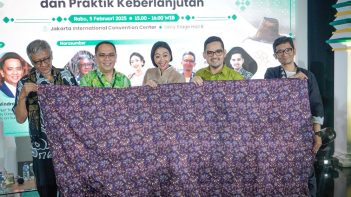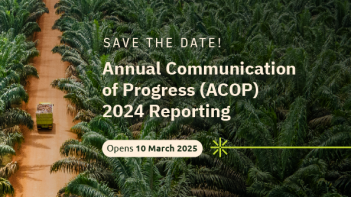A smallholder cooperative located in a peatland-rich area in the Riau province of Indonesia has become the first ever group of independent farmers in the world to receive RSPO certification through cultivation on terrestrial wetland.
The Beringin Jaya Cooperative, consisting of 209 independent oil palm growers, first became aware of best management practices of oil palm farming after a socialisation exercise in their community in 2017.
Mustawi, Group Manager for Certification of the Cooperative, said it was Jakarta-based World Resources Institute (WRI) Indonesia, a non-profit research organisation, that first introduced the concept of sustainable practices to the smallholders. “We started oil palm cultivation back in 2005 after farmers quit rubber production. Back then, we didn’t know much about environmentally sustainable practices, we just applied what we thought were good methods to get results,” he shared.
People and peat protection
Bukti Bagja, Land Use Accountability Project Lead of WRI, said the introduction of RSPO Principles was carried out with the full support of the Siak district government and its agriculture office, who were the first to encourage farmer groups to join RSPO.
“The district government is very interested in getting a smallholder plantation model that can apply best management practices as a way out of the conflict of interest between peat protection and people's needs,” said Bagja. “Applying RSPO principles is the most viable solution today for the large number of people who live on peatlands and depend on oil palm plantations for their livelihood. By becoming a member of RSPO, farmers will be motivated to address the water management aspects of peatland, prevent land fires, and protect biodiversity while still meeting their daily needs.”
Mustawi added that after WRI had introduced and socialised the smallholders on the details and benefits of sustainable practices, they gained a much better understanding of why such practices were vital. “We were interested in participating in the efforts to conserve the natural environment, as our lives and livelihoods depend on these natural resources.”
Training sessions were later held for the farmers to learn more about best practices, with subjects ranging from plantation maintenance, chemical use and pest control, harvesting methods, health and safety in plantations, to other related issues which enriched participants’ knowledge.
Improving crop productivity on peatland
Some members of the Beringin Jaya Cooperative are also personnel of the Manggala Agni Brigade, the emergency response team formed by the Indonesian Government specialising in land and forest fires. “The people in this village are quite environmentally literate, in that they are never involved in land burning as a part of plantation preparation. This is a very sensitive issue in sustainable practices,” said Mustawi.
Another supportive aspect was the introduction of the AeroHydro Culture technology, an innovative methodology developed in Japan to preserve peatland when used as plantation land. The method supplies nutrients and oxygen to the peatland surface to improve crop productivity.
Mustawi said the technology was brought in as a collaborative project by several parties, including WRI, the Siak Administration, and several Indonesian agencies and institutions, as well as civil society and non-governmental organisations.
Mustawi revealed that the next step planned by the Cooperative is to adopt measures to handle floods that usually hit the plantation during the rainy season. “We will need further discussions to find the best solution — we will need support from local and central government offices for this endeavour. Once in place, we hope more farmers will join us, so that sustainable practices can be applied on a wider scale.”
Keep reading
Call for Proposal: Independent Review of RSPO Standards Review and Revision Process
Call for Expression of Interest: Thailand National Interpretation Task Force
Call for Expression of Interest: Grower Incentives Task Force (GITF)

Launch of Sustainable Palm Oil Based Batik Wax – A Fusion of Cultural Heritage and Sustainable Practices

ACOP 2024 Reporting Period Approaching
Call for Expression of Interest: Indonesia National Interpretation Task Force for 2024 RSPO Independent Smallholder (ISH) Standard

Extraordinary Update of the Shared Responsibility (SR) Scorecard
Supply Chain Certification (SCC) Standard Review




